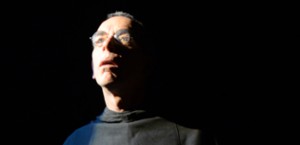The Nazis arrested St. Maximilian Kobe in 1941 and sent him to Auschwitz. At one point, after a prisoner had tried to escape, the guards killed 10 to disuade others from doing the same. St. Maximilian offered himself in place of a young husband and father. He died after suffering two weeks of starvation and thirst.

The one-man performance of “Maximilian: Saint of Auschwitz” will be a part of the Fortnight for Freedom, a 14-day effort to call Catholics and people of good will to stand for religious liberty. Performances will be at 7:30 p.m. July 2-3 at Mount Claret Retreat Center. There’s a suggested donation of $10. “The drama’s message is certainly timely and educational in the spirit of the Fortnight for Freedom,” said Janice Gonzalez of St. Luke’s Productions.
“Maximilian” premiered at the 1993 World Youth Day in Denver before an audience of 2,500. In honor of the opening, actor Leonardo Defilippis was given a special plaque of St. Maximilian signed by Francis Gajowniczek, the very man for whom Fr. Maximilian offered his life at Auschwitz. At a special World Youth Day 2000 performance, several thousand witnessed the production at the Basilica of Our Lady of the Angels and Martyrs in Rome, Italy.
The performance opens with the young Raymond Kolbe, son of devout Polish parents, expressing his desire to be a priest. In spite of the trials he encounters as a seminarian, he is sustained in his journey to the priesthood by a vision from the Blessed Mother whooffers him the choice between two crowns — one of purity or one of martyrdom. He boldly chooses both. This now sets the stage for the unfolding of the intense plot.
As a student friar, Maximilian establishes the Marian organization, Militia of the Immaculata which is dedicated to restoring the world to Christ through Mary in a fearless and radical way. Shortly after Kolbe’s ordination, the Militia of the Immaculata receives the Church’s blessing as a “Pious Union.” The organization applies the spirit of evangelization by reaching out through the media with the popular magazine “Knight of the Immaculata.” In spite of growing political tensions, the friar’s magazine plays a significant role in spiritually preparing the people of Europe for the coming holocaust.
Fr. Maximilian courageously speaks of the looming battle against government control, perseveres against evil and the forces of Nazism, and eventually exposes the real enemy. Hesees the Holy Mother as God’s agent in battling the darkness which was gathering in opposition to the Church and indeed, covering the whole world. This heroic priest encourages others through his own witness to pray for the conversion of the enemy of the Church, by making a call to action through prayer — to Our Lady and the rosary.
In 1941, Fr. Maximilian Kolbe is arrested by the Gestapo and sent to the infamous Auschwitz death camp where he is forced into slave labor and tortured. In a riveting scene, the saint offers to take the place of a married man condemned to death by starvation, fulfilling the very words of Christ: “Greater love has no man than this, that a man lay down his life for his friends.”
Proving that death is not the end, but only the beginning, this story is one of sacrificial love and ultimately, of martyrdom for the Catholic Church. Defilippis says, “St. Maximilian Kolbe has a powerful yet cautionary message for all of us – to not take the freedoms we cherish for granted, but rather to defend them with our lives.”
Now, perhaps more than ever, this production on the life of this true hero offers an engaging way of educating the faithful to the dangers we face in the current attack on religious freedom. Kolbe teaches us by his words, “I don’t fear death, I fear sin.”






